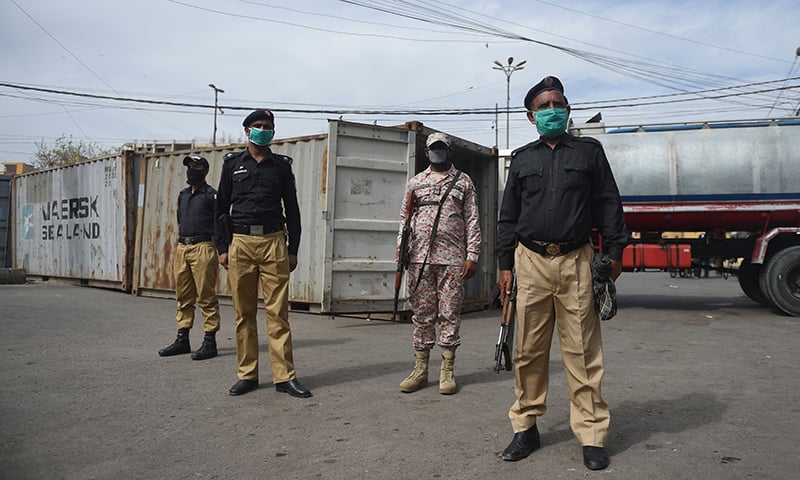Hours after the federal government announced the National Coordination Committee's decision to ease some lockdown restrictions across the country, the Sindh government has decided to allow the resumption of certain economic activities, albeit with the condition that they follow precautionary measures to contain the spread of the novel coronavirus.
A notification to this effect issued by the Sindh home department late on Tuesday evening reflected some of the relief measures granted to certain industries in line with the NCC's recommendations.
To remain closed
The notification, a copy of which is available with Dawn.com, states that all educational institutions, public places, marriage halls, shopping malls, cinemas, beauty parlours, electronic markets and markets or shops selling non-essential items are to remain closed.
Restaurants too will remain closed for dine-in and take-away, although they are now allowed to deliver at home.
The provincial government has also ordered public places such as beaches, parks and play grounds to be sealed. The ban on religious and social gatherings is also maintained.
Meanwhile, all modes of public transport are also banned.
The notification states that all grocery stores as well as medical stores that are not located close to hospitals are to remain closed between 5pm and 8am. Petrol pumps are also to remain closed during this time.
May open, contingent upon verification
Meanwhile, the Sindh government has decided to allow personnel and entities associated with the following services to resume work, provided they abide by the mandated precautionary measures.
- Plumbers, carpenters, electricians
- Dry cleaners, laundry
- Horticulture, botanical
- Veterinary services
- Software, programming
- Glass manufacturing
- Bookshop, stationery
- Construction industry
- E-commerce (export), business process outsourcing, call centres
- Energy sector (Gas, LNG, refineries, exploration)
- Export-oriented industries
- Industries with labour within premises
- Industries with low labour component — cement, chemicals and fertilisers
- Paper and packaging
The notification adds that any business entity found violating the SOPs "shall have the permission given to them during Covid-19 emergency suspended immediately and such work places may be closed".
Some of the general precautionary measures mandated by the government for those businesses/operations that have been allowed to operate include:
- No person is allowed in public places without a valid reason
- No more than two people travelling in one car
- All those in public places must wear face masks
- All those suffering from flu-like symptoms must not visit public places
SOPs for e-commerce
According to another notification by the Sindh home department, a select few delivery companies have been allowed restricted services — for delivering groceries, medicines and relief goods — under certain conditions.

These include:
- Items classified as essential will only be allowed for delivery
- All courier staff must wear protective helmets, masks and gloves
- Riders must maintain a distance of over one metre during all interactions
- Riders must avoid exchanging any other item other than the package and the money to be collected.
NCC meeting
Earlier in the evening, Prime Minister Imran Khan had announced that the restrictions imposed by the government on public gatherings, assemblies and the opening of educational institutions would remain in place for another two weeks, but restrictions would be lifted from some industries so that economic activity may resume.
Sharing the decisions taken by a meeting of the National Coordination Committee with the media, the premier noted that the government had announced a lockdown after 26 cases were confirmed in the country and thanked the public for restricting themselves to their homes in the subsequent days.
He said that all the provinces had also reached "98pc consensus" on which industries to reopen and which would remain closed. The prime minister clarified that the Centre would not impose its decisions onto the provinces, which he said had the right to further delay the opening of industries if they so wished.














































